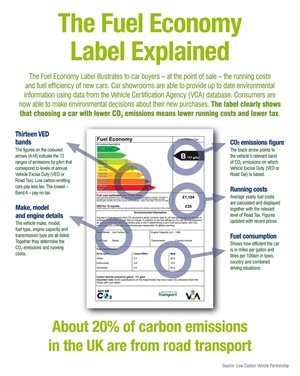LowCVP completes study to inform presentation of environmental information to car buyers
Wed 22 August 2018
View all news

The LowCVP has recently completed a research study to provide insights into how car buyers access and perceive environmental and fuel consumption information relating to vehicles and fuels and how this can affect purchase decisions. The study will help inform the presentation of future ‘environmental’ labels and other manifestations of information for car buyers.
The LowCVP facilitated the introduction of the original colour-coded fuel economy label for new cars and has been working for over ten years to improve consumer information relating to low emission vehicles and fuels. This is an important area of LowCVP's work, aiming to raise awareness about, and stimulate the purchase of, low and ultra-low emission cars.
The car buyer research comprised an on-line survey, conducted over five weeks earlier this year. In total, there were 3500 respondents (95% private, 5% business representatives) to the survey and the study also comprised of several focus groups.
The research looked at where consumers access information about a prospective car purchase, what are the most visited sources of information, and which are the most powerful influences on buying behaviour, amongst other questions.
It also looked at how people prefer to see comparative fuel, VED and other running cost information for conventional ICE engine cars as well as the new wave of battery and plug-in hybrid vehicles that are now coming to market.
In addition, the research analysed the level of consumer awareness and understanding of the new WLTP drive cycle (which replaces NEDC on 1 September 2018) and how the characteristics of the new cycle might be presented in the most accessible way. It suggests that the more accessible ‘LowCVP journey type’ terminology could be used to present miles-per-gallon and other information for the new WLTP cycles.
Among the key findings were that while car buyers are increasingly turning to alternative sources of information in helping them make their car purchase decision, dealerships are still the most important single influence on that decision, followed by car review websites. The internet is the main source of research throughout the car buying journey.
Reliability, safety and purchase cost still figure most highly in the buying decisions of private buyers but ‘monthly acquisition cost’ comes closely behind, reflecting the growth in vehicle leasing as an alternative to outright purchase. Plug-in and battery electric vehicle purchasers have similar priorities to buyers of ICE vehicles but a concern for air quality and CO2 emissions, unsurprisingly, comes higher up the list of those buying EVs.
Among other key findings, the research pointed to the need for consumers to receive the ‘right’ information earlier in car buying process to influence choice towards more efficient cars.
The study provided a series of detailed recommendations to inform how information can best be provided to consumers in future, including future manifestations of the colour-coded car label. For more information on the recommendations and other details about the study please see the linked presentation.
Related Links
< Back to news list